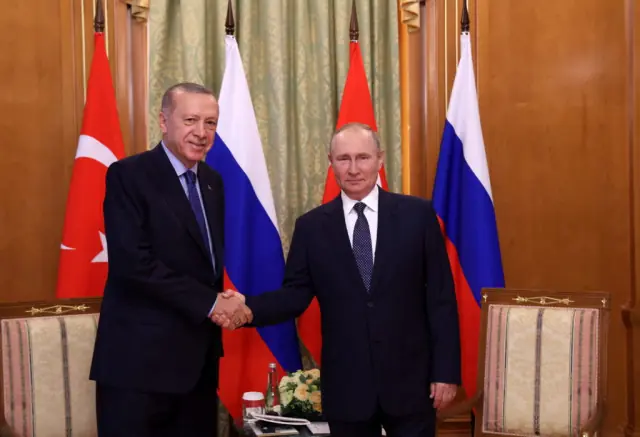Ankara—In a strategic pivot reflecting its evolving foreign policy, Turkey has formally applied to join the BRICS group of emerging-market nations, signaling its desire to strengthen ties with non-Western powers while navigating ongoing tensions with its traditional Western allies. The application marks a significant step in Turkey’s efforts to assert itself as a key player in a multipolar world.
The BRICS group, initially composed of Brazil, Russia, India, China, and South Africa, has positioned itself as an alternative to Western-dominated global institutions, such as the International Monetary Fund (IMF) and the World Bank.
In recent months, BRICS has expanded its membership to include several new countries, including Iran, the United Arab Emirates, Ethiopia, and Egypt, and is reportedly considering further enlargements.
According to sources familiar with the matter, Turkey submitted its BRICS membership application several months ago, driven by a combination of geopolitical shifts, stalled European Union accession talks, and Ankara’s dissatisfaction with its current relationship with NATO.
Turkish President Recep Tayyip Erdogan’s administration views BRICS membership as a way to diversify Turkey’s international alliances, bolster its economy, and reinforce its growing influence on the global stage.
Straddling East and West
Turkey’s bid to join BRICS highlights its balancing act between East and West, a diplomatic strategy that has become increasingly prominent under Erdogan’s rule.
Speaking at a recent event in Istanbul, Erdogan underscored the importance of maintaining relations with both Eastern and Western powers, stressing that any attempt to exclude one side would undermine Turkey’s broader strategic interests.
“Turkey is at a crossroads between continents, cultures, and economies,” Erdogan said. “We will continue to engage with all global actors, whether in the West or the East, to strengthen our position in the world.”
Ankara’s desire to join BRICS comes amid growing frustration over its longstanding attempt to join the European Union, a process that has been stalled for nearly two decades.
Turkey first applied for EU membership in 1987 and began formal accession negotiations in 2005. However, progress has been slow due to concerns over Turkey’s democratic practices, human rights record, and disputes with EU member states, particularly Greece and Cyprus.
Erdogan’s government believes that joining BRICS could enhance Turkey’s economic ties with key members such as China and Russia, as well as provide a new platform to engage with other emerging economies in Africa, the Middle East, and Asia.
Tensions with NATO Allies
Turkey’s pursuit of BRICS membership also reflects its increasingly complicated relationship with NATO, particularly in light of Ankara’s continued cooperation with Russia following its invasion of Ukraine in 2022.
While Turkey remains a critical member of NATO, its refusal to fully align with the West’s stance on Russia has caused friction with its allies.
This is particularly evident in Turkey’s decision to purchase Russian S-400 missile defense systems, a move that led to U.S. sanctions and raised questions about Turkey’s future in the alliance.
At the same time, Erdogan’s administration has faced domestic criticism for its handling of relations with NATO, with some arguing that Turkey’s independent foreign policy risks alienating key Western partners.
However, Erdogan has consistently defended his approach, arguing that Turkey’s national interests should take precedence over external pressures.
The BRICS alliance could provide Turkey with an alternative avenue to assert its independence on the global stage while continuing to engage with both NATO and the EU.
Turkey’s Foreign Minister Hakan Fidan, who attended a BRICS meeting in June, emphasized the importance of diversifying Turkey’s global partnerships, calling BRICS “a crucial platform” for developing new economic approaches.
A Global Economic Strategy
For Turkey, joining BRICS is not just about geopolitics—it is also a key component of its economic strategy. With inflation soaring and its currency under pressure, Turkey is seeking new trade partnerships and investment opportunities.
BRICS membership could open doors for Turkey to collaborate with China, Russia, and other emerging economies on infrastructure projects, energy initiatives, and technology development.
In particular, Turkey has been courting investment from Chinese electric vehicle manufacturers, hoping to leverage its customs union with the EU to expand market access.
Chinese companies have shown interest in establishing manufacturing facilities in Turkey, which could allow them to sell vehicles to Europe without facing tariffs.
Erdogan’s administration sees this as a win-win opportunity that could enhance Turkey’s role as a bridge between Europe and Asia.
Turkey is also looking to expand its energy exports, particularly through partnerships with BRICS members.
Russia, in particular, remains a key energy supplier for Turkey, providing natural gas through pipelines such as TurkStream. Closer ties with BRICS members could further solidify Turkey’s position as an energy hub for both Europe and Asia.
Despite its focus on BRICS, Turkey has not abandoned its EU ambitions. Following informal talks with EU counterparts, Foreign Minister Fidan reiterated Turkey’s commitment to reviving its EU accession process.
“EU membership remains a strategic goal for Turkey,” Fidan said, “but we believe that diversifying our global partnerships will ultimately strengthen our position in Europe as well.”
Looking Ahead
The upcoming BRICS summit in Kazan, Russia, is expected to address the group’s future expansion, with countries like Malaysia, Thailand, and Azerbaijan also expressing interest in joining.
While it remains to be seen whether Turkey’s application will be accepted, its bid signals a broader shift in global geopolitics, as emerging-market nations seek to reshape the world order.
For Turkey, BRICS membership represents a strategic opportunity to enhance its global standing, build new alliances, and reduce its dependence on Western powers.
However, balancing its relationships with both East and West will continue to be a delicate task for Ankara, as it navigates the complexities of a multipolar world.
As Turkey pursues its BRICS ambitions, it will need to carefully manage its relations with NATO, the EU, and other key partners to ensure that it can maintain its influence on the global stage while avoiding potential pitfalls.

